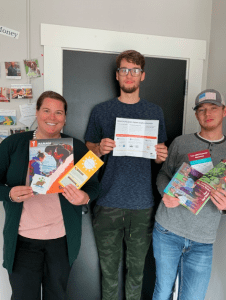Leanna Farr Contributing Writer
When it comes to finances, the UMF Financial Literacy Peer Educators (FinLit), is the place to go. The program was created last year after Janet Mills, former state attorney general and the current governor of the state of Maine, donated $901,000 to a grant to fund the program which was set to be implemented at all seven public universities in Maine by 2021.
FinLit provides various financial services, such as one-on-one appointments and exit loan counseling on top of organizing presentations and events. The peer educators are experts on FAFSA, credits, loans, budgeting, investing, taxes, and saving.
With coordination from Sarah Hinman, the Financial Literacy Peer Education Coordinator, UMF was the first campus to implement the financial literacy program. Hinman has implemented the same program at the University of Maine at Augusta and University of Maine at Orono this year.
Caleb Grover, a senior business economics major, has been a peer educator since the program began last year. “Our most popular service is filing the FAFSA with students,” said Grover. “One of the program’s missions is to increase the number of students filing their FAFSA in the state of Maine.” Only around 40% of students are filing their FAFSA to receive financial aid, grants and work-study.

Sarah Hinman, Jacob Leonard, and Caleb Grover, Members of the #FinLit Squad (Photo courtesy of Leanna Farr)
To try and help students with filing their FAFSA, FinLit held an event where peer educators helped students file their FAFSA for free while eating cake. They also advertised a drawing for a $25 gift card. “It went really well, even better than last year which went really well for the first year having it,” Grover said. “This year there was even higher attendance. There was at least one student there at all times.”
“The key to our success is definitely partnering with other offices to promote and have support for bigger campus-wide events,” Hinman said. They achieve this by giving presentations for admissions with visiting high school students and working with the career services and Merrill Hall.
When discussing the work as a peer educator Grover said “it’s a professional but relaxed environment where we help students face challenges so they don’t make the same mistakes we did.” Working with other students has made him realize “there are a lot of situations you don’t realize are going on until you hear someone’s situation,” he said, “it is grounding working with people that have it a lot worse than you and you offering them help.
Jake Leonard, a junior in the computer science major, also works as a financial peer educator. “There is a lot going on with other student’s finances that you wouldn’t expect. Some people come it not knowing that they owe $30,000 and others are really stressed but only owe a minimal amount,” he said. “There’s a visible weight lifted when people come in and sit with us and understand.”
For more information about upcoming events, learn more about the peer educators, and get financial tips, check out their Instagram @umf_finlit. The peer educators can also found in room 201 at Franklin Hall.